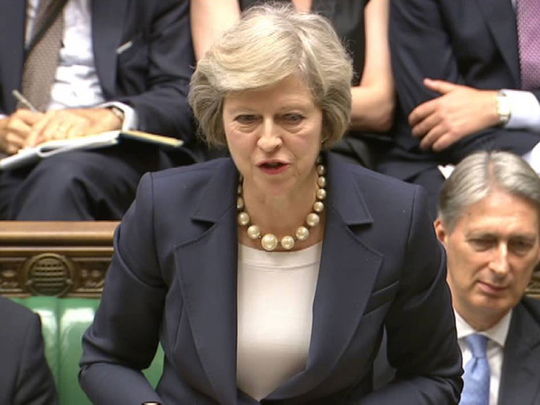
The surprise UK general election outcome, which saw the opposition Labour Party make striking gains, has key implications for British politics. While the Conservatives will lead the next government — and have reached an understanding with the 10 Democratic Unionists MPs from Northern Ireland to allow Prime Minister Theresa May to form a new administration — the governing party’s position has been weakened in the House of Commons, and opposition groups are calling on May to resign.
This turn of events could have substantial implications for Brexit given the formal start next week of negotiations with the EU. In April, May declared that she had called the election as she was not prepared to allow opposition parties to hold her hard Brexit stance to ransom.
Her ambition had been to try to win a massive majority to bolster her negotiating hand with the EU. However, this has not happened and the campaign has instead significantly weakened her position.
Not only has the election been much more difficult than expected for May. It has also failed to give the clarity she sought over Brexit. Indeed, perhaps the most extraordinary aspect of the last few weeks was the ‘missing debate’ over this issue, despite the fact May called the snap election to bring this centre stage. To be sure, the subject of the UK’s exit from the EU remains salient with many voters. But it has not dominated debate in the way May had apparently intended.
The fact Brexit has not featured more prominently in the campaign, combined with the unexpectedly poor performance of the Conservatives, means that key questions remain unanswered about the UK’s negotiating strategy with the EU. Moreover May has failed to forge the national consensus she had hoped for around her Brexit stance.
This is important because — a year after last year’s EU referendum — there still is not a strong agreement across the nation behind any specific version of Brexit, whether hard or soft, disorderly or orderly. Indeed, continuing divisions within the electorate on these issues (perhaps as big as on the basic merits of last June’s referendum decision itself) are still underlined in polls which tend to show the country broadly split over whether maintaining access to the European single market, or being able to limit migration, should be the key objective in negotiations.
May had wanted to try to see this issue resolved in the election. Yet, this has not happened, and the unexpected result means that she cannot plausibly claim to have the overwhelming backing of the country behind her Brexit position.
This will have been noted in Brussels and across the EU too, as will have the fact of May’s weakened leadership. That the Conservatives lost seats, falling short of an overall majority in the House of Commons, reflects the poor campaign performance of the prime minister whose authority has been badly damaged and she may well stand down, or be usurped, from Downing Street during the course of coming months.
May, unexpectedly, called the snap election in April when the Conservatives held a commanding 20 percentage point lead in polls. Had this been borne out in Thursday’s results the Conservatives could have secured a landslide of more than a 100 seat majority in the House of Commons. However, polls tightened significantly during May and June.
A key reason why the Conservatives lost ground during the campaign is perceptions of May’s performance. She went into the election with sky-high popularity yet her approval rating dropped around 20 percentage points since then in some polls to just over 40%. This is around the same level as Labour leader Jeremy Corbyn whose own ratings have improved significantly in the last few weeks from a significantly lower level.
May made her self-ascribed “strong and stable” leadership a central element of the campaign. Yet, this has backfired badly, especially given her unwillingness to debate directly with other leaders — including a head-to-head with Corbyn — which generally played badly with the electorate.
. Her lack of such experience shone through and she appeared rattled on several occasions. She also made tactical May’s personal polling slump partially reflects the fact that she had never before led a general election campaignmistakes and u-turns, including becoming the first party leader in modern UK political history to abandon a key manifesto pledge — over social care costs — before election day.
By contrast, Corbyn exceeded most expectations about his campaign performance. His learning curve as party leader in a largely hostile UK media environment over much of the last two years has been steep, and the experience he has assumed has generally shown through in a campaign that could have been very difficult for him over multiple issues including Brexit.
Corbyn and Labour were also aided by the failure of the Liberal Democrats to make more headway in the campaign. While the party made a net gain of seats, it failed in its attempts to achieve a decisive electoral breakthrough by positioning itself as the voice of ‘Remain’ voters from last year’s EU referendum.
This stance has given the party clearer differentiation against all the main UK parties, and led it in December to win a by-election victory in London last December against the Conservatives when Brexit was the defining issue. However, it did not lead to any overwhelming electoral benefits on Thursday, and the party only picked up a handful of MPs from a very low base.
Taken overall, the national consensus May sought on Brexit has failed to materialise and there is now added uncertainty over the UK’s negotiating stance with its EU partners. Her gamble in calling the election has backfired badly and her future as prime minister and Conservative leader is now much more precarious.
Andrew Hammond is an Associate at LSE IDEAS at the London School of Economics










